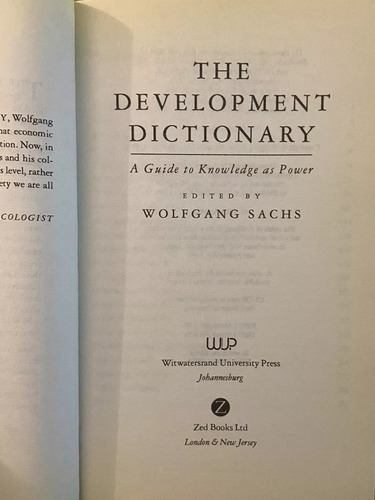





The Development Dictionary, Wolfgang Sachs (Reacondicionado)
Lo que tienes que saber de este producto
- Género: Derecho, política y ciencias sociales.
- Subgénero: Social studies.
- Manual.
- Número de páginas: 306.
- Edad mínima recomendada: 10 años.
- Dimensiones: 14cm de ancho x 22cm de alto.
- Peso: 450g.
- ISBN: 1856490432.
Características del producto
Características principales
Título del libro | The Development Dictionary |
|---|---|
Subtítulo del libro | A Guide to Knowledge as Power |
Autor | Wolfgang Sachs |
Idioma | Inglés |
Editorial del libro | ZED BOOKS LTD |
Edición del libro | 1a Edición |
Tapa del libro | Blanda |
Volumen del libro | Volumen 1 |
Con índice | Sí |
Año de publicación | 1995 |
Otros
Cantidad de páginas | 306 |
|---|---|
Altura | 22 cm |
Ancho | 14 cm |
Peso | 450 g |
Material de la tapa del libro | Carton blando |
Con páginas para colorear | No |
Con realidad aumentada | No |
Género del libro | Derecho, política y ciencias sociales |
Subgéneros del libro | Social studies |
Tipo de narración | Manual |
Edad mínima recomendada | 10 años |
Escrito en imprenta mayúscula | No |
Cantidad de libros por set | 1 |
ISBN | 1856490432 |
Descripción
Su libro se vende reacondicionado: el producto fue revisado para asegurar un buen estado. Sin embargo, es importante tener en cuenta que tendrá marcas de tiempo, uso por almacenaje pero sigue siendo una opción confiable y a un precio más asequible.
Libro reacondicionado en muy buen estado, sin anotaciones, ni subrayados contenido íntegro.
SINOPSIS
The original critical guide to key concepts in development studies from some of the world's most eminent critical development scholars and practitioners.
Each essay in this now classic collection examines one key development concept, from the 'environment' to 'needs' and 'progress' to 'production'. Each concept is reviewed from a historical and anthropological point of view, with particular bias and intellectual flaws being highlighted. Overall, the authors argue that we must bid farewell to the whole idea of Eurocentric development in order to liberate people's minds in both North and South and to mobilize for bold responses to the environmental and ethical challenges now confronting humanity.
The result is an indispensable resource for scholars, practitioners, movements and students of development which invites us to recognize the tinted glasses we put on whenever we participate in the development discourse.
